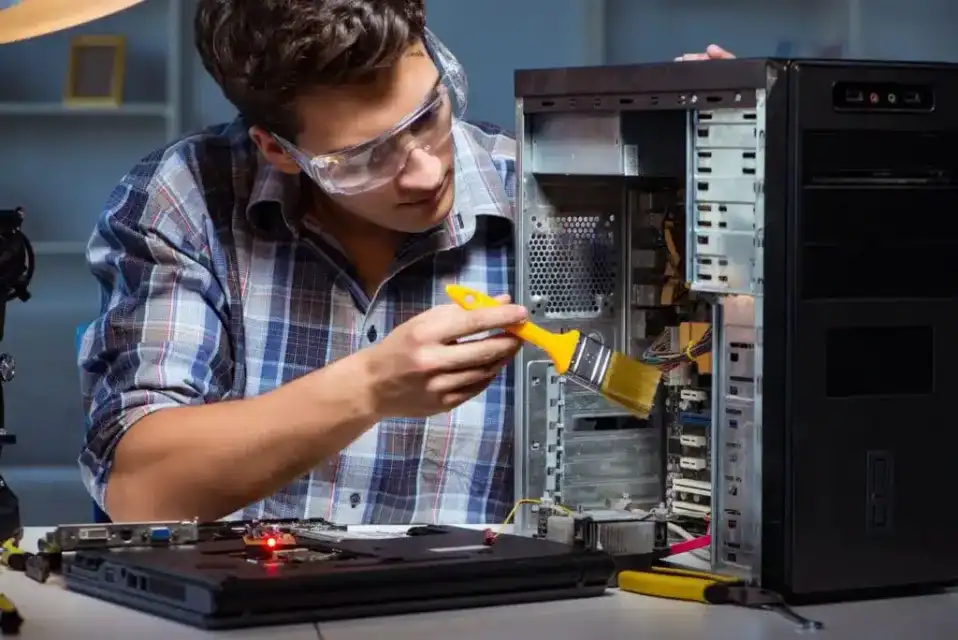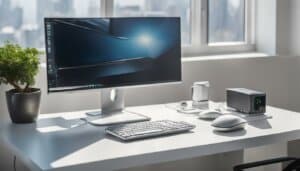Table of Contents
In today’s digital age, computers have become an indispensable part of our daily lives, both personally and professionally. As such, Maintaining Your Computer’s Health is crucial for ensuring optimal performance and longevity. Whether you’re a casual user or an IT professional, understanding the best practices for computer maintenance can save you time, effort, and even money in the long run.
This comprehensive guide aims to equip you with the knowledge and tools you need to keep your computer running smoothly. From hardware care to software optimization and security measures, we’ll cover all the essential aspects that contribute to your computer’s overall health.
So, let’s dive into the best practices for maintaining your computer’s health and ensure that you’re getting the most out of your investment.
Essential Hardware Care: Prolonging the Lifespan of Your Physical Components
When it comes to maintaining your computer’s health, the physical hardware is just as important as the software. Regular care of these tangible components can significantly extend the lifespan of your computer and optimize its performance.
Cleaning and Dusting
One of the most straightforward yet crucial aspects of hardware maintenance is regular cleaning. Over time, dust and debris can accumulate inside your computer, leading to issues like overheating. To ensure optimal cooling and airflow:
- Use compressed air to gently clean internal components such as fans and heatsinks.
- Wipe down external parts like the keyboard and monitor with a soft, lint-free cloth.
- Aim to perform this cleaning at least once a month.
Proper Ventilation
The location where you place your computer can have a significant impact on its health. Ensuring good ventilation can prevent overheating, which is a leading cause of hardware failure. To optimize ventilation:
- Keep your computer in an open area, away from walls or other obstructions that could block airflow.
- Place it on a hard, flat surface to allow for better ventilation.
- Consider additional cooling solutions like cooling pads for laptops or external fans for desktops.
Battery Maintenance
For laptop users, taking care of the battery is essential for prolonging its lifespan and, by extension, the lifespan of your laptop. To maintain a healthy battery:
- Cycle the battery between 20% and 80% rather than keeping it at 100% charge all the time.
- Use battery-saving modes to optimize power usage.
- Calibrate the battery every few months to ensure accurate status reporting.
By diligently following these hardware care practices, you’re taking significant steps toward maintaining your computer’s health. This will help ensure that your machine remains reliable and efficient for years to come.
Software Optimization: Enhancing Performance and Security for a Healthy Computer
Software plays an integral role in maintaining your computer’s health. From the operating system to individual applications, keeping your software optimized is key to ensuring that your computer runs both smoothly and securely.
Regular Software Updates
Keeping your operating system and all installed applications up-to-date is not just about having the latest features; it’s also about security and performance. Software developers regularly release updates that:
- Patch security vulnerabilities, reducing the risk of malware attacks.
- Improve performance by optimizing code.
- Add new features or improve existing ones for better functionality.
It’s advisable to enable automatic updates where possible, or at least to regularly check for updates manually.
Antivirus and Malware Protection
In today’s digital landscape, the threat of viruses and malware is ever-present. A robust antivirus program is your first line of defense against these threats. To maximize protection:
- Choose a reputable antivirus software with real-time scanning capabilities.
- Keep your antivirus definitions updated for the latest protection.
- Perform full system scans at regular intervals, at least once a month.
Disk Cleanup and Defragmentation
As you use your computer, it’s common for unnecessary files to accumulate, taking up valuable disk space and potentially slowing down your system. To optimize disk space:
- Use built-in disk cleanup utilities to remove temporary files, system cache, and other non-essential data.
- Defragment your hard drive if you’re using an HDD. Note that SSDs don’t require defragmentation.
- Consider using third-party optimization tools for a more thorough cleanup.
Startup Management
Programs that start automatically when your computer boots can significantly slow down the startup process. Managing these can improve your computer’s boot time:
- Use the Task Manager on Windows or System Preferences on a Mac to manage startup programs.
- Disable programs that are not essential at startup.
- Be cautious when disabling startup items; some may be necessary for your system to function correctly.
Data Backup
The importance of regularly backing up your data cannot be overstated. In the event of hardware failure or a security breach, backups ensure that your data is safe:
- Use external hard drives or cloud storage for backups.
- Set up automatic backups where possible.
- Ensure that your backup solution is secure to protect against unauthorized access.
By taking a comprehensive approach to software optimization, you’re making a significant contribution to maintaining your computer’s health. These practices will not only enhance your computer’s performance but also fortify its security, providing a more efficient and safer computing experience.
Advanced Techniques: Mastering the Art of Computer Maintenance
When it comes to maintaining your computer’s health, going beyond the basics can offer significant benefits. These advanced techniques provide a more comprehensive approach to computer care and are particularly useful for those who rely heavily on their systems for work or other resource-intensive tasks.
System Monitoring
Monitoring your computer’s system performance can offer valuable insights into its overall health. This involves keeping tabs on:
- CPU Usage: High CPU usage for extended periods can lead to overheating and reduced performance.
- Memory Allocation: Excessive memory usage can slow down your computer and may indicate a need for hardware upgrades or software optimization.
- Disk Activity: Constant high disk activity could signify a failing hard drive or software issues.
Various software tools are available for system monitoring, each offering different features tailored to your needs.
Network Security
A secure network is crucial for both personal and business use. Enhancing your network security involves:
- Firewalls: These act as barriers between your computer and potential threats from the internet.
- VPNs: Virtual Private Networks encrypt your online activity, making it more difficult for hackers to intercept your data.
- Regular Security Audits: Conducting periodic checks on your network can identify vulnerabilities before they become a problem.
Custom Cooling Solutions
For users who engage in resource-intensive activities like gaming or video editing, custom cooling solutions can be a game-changer. Options include:
- Liquid Cooling: More efficient than air cooling, but also more complex to install.
- Aftermarket Fans: These are often more effective than the stock fans that come with your computer.
- Thermal Paste: Reapplying thermal paste can improve heat conduction away from the CPU.
Automated Maintenance Scripts
For those with technical expertise, automated scripts can perform a range of maintenance tasks, such as:
- Temporary File Cleanup: Automate the removal of unnecessary files that clog up your system.
- Software Updates: Schedule updates during off-hours to avoid disruptions.
- System Checks: Run diagnostics to catch issues before they become major problems.
Hardware Upgrades
Sometimes, the most effective way to improve performance is through hardware upgrades:
- RAM: Adding more RAM can significantly speed up tasks that use a lot of memory.
- SSD: Switching from an HDD to an SSD can drastically improve boot times and data transfer speeds.
- Graphics Card: For tasks like video editing or gaming, a new graphics card can make a noticeable difference.
For a deeper dive into advanced computer maintenance techniques, you may find this comprehensive guide by HP to be a valuable resource.
By incorporating these advanced techniques into your regular maintenance routine, you’re taking a holistic approach to maintaining your computer’s health. This will not only optimize performance but also extend the lifespan of your machine.
Frequently Asked Questions (FAQs): Clarifying Common Concerns
In this section, we’ll address some of the most commonly asked questions about maintaining your computer’s health. These FAQs aim to provide quick answers to typical concerns and further clarify the information presented in this guide.
How often should I clean my computer?
It’s advisable to clean the internal and external components of your computer at least once a month to ensure optimal cooling and airflow.
Is antivirus software really necessary?
Yes, antivirus software is essential for protecting your computer from malware and other security threats. It’s crucial to keep it updated for the most effective protection.
What are the signs of a failing hard drive?
Common signs include frequent crashes, slow file transfers, and strange noises. If you experience any of these symptoms, it’s advisable to back up your data immediately and consult a professional.
How can I improve my computer’s startup time?
Managing startup programs by disabling unnecessary ones can significantly improve your computer’s boot time. This can be done through the Task Manager on Windows or System Preferences on a Mac.
Do I need to defragment my SSD?
No, SSDs do not require defragmentation. In fact, defragmenting an SSD can reduce its lifespan.
How often should I update my software?
It’s best to keep your operating system and applications up-to-date by enabling automatic updates or regularly checking for updates manually.
What is the benefit of custom cooling solutions?
Custom cooling solutions like liquid cooling are more efficient than standard air cooling, especially for resource-intensive tasks like gaming or video editing.
By addressing these frequently asked questions, we hope to provide you with quick, straightforward answers to common concerns about maintaining your computer’s health.
Conclusion: The Holistic Approach to Computer Health
As we conclude this in-depth guide, it’s clear that maintaining your computer’s health is a multifaceted endeavor that involves both hardware and software considerations. From basic cleaning and software updates to advanced techniques like system monitoring and custom cooling solutions, each aspect plays a crucial role in ensuring that your computer runs efficiently and securely.
The digital age demands that we rely heavily on our computers, making their health and longevity more important than ever. By implementing the practices outlined in this guide, you’re taking a proactive approach to computer care, ensuring that your machine serves you well for years to come.
Thank you for joining us on this comprehensive journey through the best practices for computer maintenance. We hope this guide serves as a valuable resource for anyone looking to optimize their computer’s performance and security.









